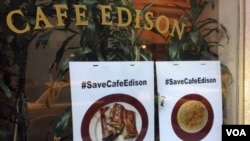Many American communities have a local family-owned restaurant that holds a special place in the neighborhood’s heart. Near New York City’s Times Square, that would be Café Edison. It is frequented by some of the biggest names on Broadway, as well as ordinary New Yorkers and tourists.
But its days may be numbered. The diner is being evicted from its home of more than 30 years in the Edison Hotel and - unless a new lease can be negotiated - it will have to close right after Christmas.
The news that Café Edison was being evicted prompted a groundswell of support on Facebook and other social media. The theater community, as well as regular customers, banded together to try to save the café, with a petition that’s gotten about 9,000 signatures, and “lunch mobs” on weekends. About 50 protesters held a rally on the sidewalk outside the restaurant. People carried signs, local politicians spoke, and a quartet sang. Some media outlets were there to cover the action.
Customer loyalty
That depth of feeling starts with the café’s founders and the way they made sure customers were treated right.
"It’s just you pay attention to them," explained Frances Edelstein, a Polish Holocaust survivor who opened the place with her husband Harry in 1980. "You ask them. You pluck them a little bit. You have to make them home, yes?"
Playwright Neil Simon certainly felt at home. In 2001, he wrote a play set in Café Edison, called 45 Seconds from Broadway. Of Frances, he said, "She’s like a Jewish mother, which she really is, and she wants you to eat!"
So did her late husband Harry. They served up what could only be called Jewish soul food - blintzes, latke potato pancakes, matzoh ball soup. In an interview before his death in 2009, he said with pride, "That’s what make us famous here. We make it every day, different soups. First, what we got is matzoh ball and noodle soup every day."
No one goes away hungry
And they made sure everybody ate, says Manny Azenberg, who’s produced most of Neil Simon’s plays and is a regular. He remembers one man who sold knock-off watches in Times Square.
"This man would come to the restaurant and go to the counter and only order soup. And Harry, being a busybody, after the third or fourth time the man came in, he said “why don’t you eat something?” And the man said he couldn’t afford it, but he had the soup, because they’re hearty soups in the winter. The man turns out to be a Muslim from Africa. Harry is a Holocaust surviving Jew and he proceeded to give orders that whenever this man comes in, he’s to be fed at no cost. It’s a great…one of the great American stories."
Azenberg says he reached deals on the café’s napkins. Playwright August Wilson sketched scenes on napkins. The Edelsteins were even given a special Tony Award for serving the industry. Everyone was family. And after Harry Edelstein died, his son-in-law, Conrad Strohl, ran the business the same way. But the Edison Hotel’s new owner wants to upgrade the space, said Strohl.
"He decided that he didn’t want us here. He didn’t want Café Edison and he wanted a white tablecloth restaurant, with a name chef."
A New York institution
The café certainly isn’t that. But it does have the kind of old-time New York charm, like vaulted plaster ceilings. That’s becoming increasingly rare, especially around Times Square, says historian Anastasia Mann, who’s been coming to Café Edison for about 15 years.
"Look at the ceilings! Not a lot of ceilings like that left in the city," she pointed out, going on to elaborate the diner's other charms. "It’s the blintzes, for sure. The waitress who calls me 'baby.' Very few people in the world I like to call me 'baby,' but she’s one of them!"
If the café closes, more than 30 employees - most of whom are immigrants like its founders - will be out of work. Polish-born waitress, Maria Horomainska, who’s worked at Café Edison for five years, says she’s sad and angry, but perks up when asked about her favorite foods on the menu.
"Pastrami on a rye - yum. Cheese blintzes - yum. Kasha varnishkes - wow! This I grew up on," she said with a laugh, "that’s why I love it!"
And that’s why a lot of people who make what’s lovingly called The Polish Tea Room a regular destination will miss it when - and if - it closes.




